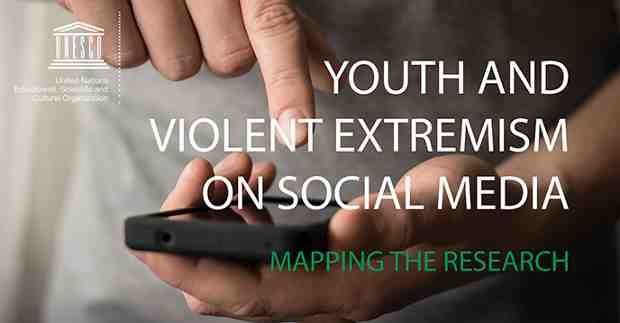UNESCO Report Reveals Violent Extremism on Social Media

UNESCO releases the study titled Youth and violent extremism on social media.
According to UNESCO, violent extremism is becoming a major challenge for many societies today and is threatening the security and fundamental rights of citizens all over the world.
Violent extremism is an affront to the principles of the United Nations, embodied in universal human rights and fundamental freedoms.
With a mandate to foster cooperation and solidarity through communication and information, UNESCO supports its Member States and civil society actors in responding to extremism and radicalization on the Internet.
All over the world, governments and Internet companies are making reactive decisions on the basis of assumptions about the causes and remedies to violent attacks. The challenge is for analysis and responses to be firmly grounded. The need is for policy constructed on the basis of facts and evidence, and not founded on hunches or driven by panic and fearmongering.
[ Slaves in Delhi: How Delhi Govt Fails to Protect Labour Rights ]
It is in this context that UNESCO releases the study titled Youth and violent extremism on social media. This work provides a global mapping of research (mainly during 2012-16) into the assumed roles played by social media in violent radicalization processes, especially as they affect youth and women across all the regions of the world.
Reviewing more than 550 published studies from scientific and “grey literature” covering titles in English, French, Arabic and Chinese languages, the research finds that violent extremists are indeed heavily spread throughout the Internet and that there is a growing body of knowledge about how terrorists use cyberspace. Less clear, however; is the impact of this use, and even more opaque is the extent to which counter-measures are effective.
[ How Governments Manipulate Social Media to Undermine Democracy ]
The study concludes that research on the subject is still at a budding stage, and it urges caution about the results and interpretations. The literature reviewed in the study provides no definitive evidence on a direct link between the specificities of social media and violent radicalization outcomes on youth. Likewise, there is no definitive evidence about the impact of counter-measures.
Nevertheless, as a whole, the literature does point towards some possible understandings. Indeed, rather than being initiators or causes of violent behaviors, the Internet and social media specifically can be facilitators within wider processes of violent radicalization.
[ Islamic State Terrorists Use Internet and Social Media for Messaging ]
The literature shows that violent extremists use characteristics of social media to attract younger audiences, to disseminate extremist, violent and criminal content, to identify potential participants, and foster one-on-one dialogue with young people.
However, as pointed out by this study, actual violent radicalization is not reducible to Internet exposure, but generally entails the mediation of several complex processes, including complex social-psychological processes and person-to-person communication in conjunction with other offline factors.
A major output of the study is a 16-point recommendation list for Member States, the private sector, Internet intermediaries, social media, civil society, and Internet users.
It recommends for instance that those actors could consider to encourage the participation of youth in decision-making processes, deepen engagement between Member States, civil society organizations and local communities, promote Media and Information Literacy (MIL) strategies, support research on the subject, ensure professional and conflict-sensitive journalistic coverage, manage expressions of hate online without compromising rights to freedom of expression, or educate Internet users about ethical online behavior and privacy issues.
The research was conducted for UNESCO by independent experts Séraphin Alava, Divina Frau-Meigs, Ghayda Hassan (with the collaboration of Hasna Hussein and Yuanyuan Wei) and will be promoted and launched at various UNESCO events. It was prepared with the support of the Information for All Programme (IFAP) of UNESCO.
Photo courtesy: UNESCO













